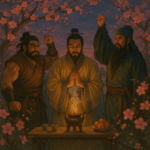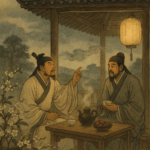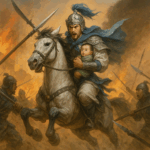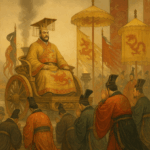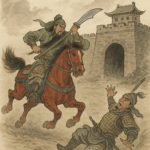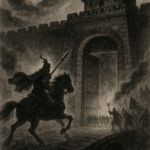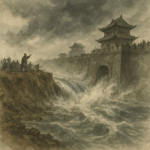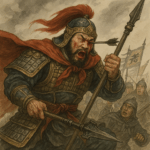Chen Deng proposed to Liu Bei, “What Cao Cao fears most is Yuan Shao. He sits like a tiger in Ji, Qing, You, and Bing provinces with a million armored troops and countless civil and military officers. Why not send a letter to him asking for help?”
Liu Bei replied, “Yuan Shao has never corresponded with me, and now that I’ve defeated his brother, why would he aid me?”
Chen Deng answered, “There is one man here whose family has been allied with Yuan Shao’s for three generations. If we can gain a letter from him to Shao, Shao will surely come to our aid.”
Liu Bei asked, “Who is this man?”
Chen Deng smiled, “He is the scholar whom Your Excellency always greeted with deference—how could you have forgotten him?”
Liu Bei’s eyes shone: “You mean Master Zheng Xuan!”
“Indeed,” Chen Deng confirmed.
Zheng Xuan—courtesy name “Xuan”—was renowned for his learning and served as a student of the great Master Ma Rong. Ma Rong’s lectures were legendary: he would pitch a red tent, seat his students in front, and entertain them with music and dance behind, yet Zheng listened three years without the slightest distraction, earning Ma’s deep respect. Upon his return home, Ma Rong sighed, “Of all my pupils, only Zheng Xuan has mastered the true principles of my teaching.” At court under Emperor Huan, Zheng rose to the post of Minister of the Secretariat, but after the Ten Eunuchs’ rebellion he resigned and retired to Xuzhou. When Liu Bei was county magistrate in Zhuo, he studied under Zheng, and again as Governor of Xuzhou he often invited him to lecture—his reverence was unmatched.
Overjoyed, Liu Bei and Chen Deng went straight to Zheng Xuan’s home and asked him to write the letter. Zheng readily agreed, penned a dispatch sealed with his signature, and handed it to Liu Bei. Under cover of night, Liu Bei sent Sun Qian with the letter to Yuan Shao.
When Shao received it, he mused, “Liu Bei destroyed my brother’s forces—by rights I should not help him. Yet this comes at Master Zheng’s command; I cannot refuse.” He summoned his civil and military council. The strategist Tian Feng cautioned, “Our people are exhausted after years of conflict, the granaries are empty—raising another great army now would be unwise. Better to send a victory report to the throne first. If denied, we can accuse Cao Cao of blocking our supply routes, then position troops at Liyang, build more boats along the Yellow River, overhaul our weapons, and garrison the frontier in strength. In three years, victory will be ours.”
Shen Pei countered, “Nonsense. With Your Excellency’s prestige and the strength of the north, attacking Cao Cao is as easy as turning one’s hand.”
Ju Shou added, “Victory lies not in numbers but in discipline. Cao Cao’s army is battle-hardened; they differ from the besieged Gongsun Zan. To forsake a sound strategy and march with untested recruits would be folly.”
Guo Tu urged, “On the contrary, we must act swiftly. By joining forces with Liu Bei under the banner of righteous cause against Cao’s usurpation, we align with both Heaven’s will and popular sentiment—this is our best chance!”
As debate raged, Shao wavered.
Suddenly Xu You and Xun Chen burst in. Yuan Shao said, “You two have keen insight—what do you advise?” After they bowed, Shao said, “Master Zheng’s letter commands me to raise troops to aid Liu Bei against Cao Cao. Shall we?”
They responded in unison, “Your Excellency wields overwhelming force to strike a smaller foe, punishing the rebel Cao to restore the Han—by all means, raise the army.”
“Just as I thought,” Shao declared.
He sent Sun Qian back to Zheng Xuan with thanks and a promise to coordinate with Liu Bei. He appointed Shen Pei and Feng Ji as his generals; Tian Feng, Xun Chen, and Xu You as counsellors; Yan Liang and Wen Chou as commanders of cavalry and infantry. He mustered 150,000 horsemen and 150,000 foot soldiers—an elite force of 300,000—to march on Liyang.
Guo Tu advised, “To justify our cause, we must enumerate Cao Cao’s crimes in a public proclamation to every commandery, making our intentions righteous.” Yuan Shao agreed and commanded his scribe Chen Lin—renowned for his eloquence—to draft the edict. Chen Lin’s manifesto began:
“History shows that in times of great peril, extraordinary men must arise to achieve extraordinary deeds. When the Qin tyrant crushed the weakened state, Zhao Gao seized power, persecuted his rivals, and brought the dynasty to ruin—yet from those ashes arose the virtuous regent, Empress Lü, who restored order by Rallying Heroes.
“Now Minister Cao Cao—his forebear a corrupt eunuch, his father a corrupt official—has plundered the state, usurped power, and trampled on propriety. He has executed loyal ministers, extorted the innocent, and polluted the Han dynasty beyond measure. Generals like Bian Rang of Jiujiang were beheaded for speaking the truth. Once more our people cry out for justice!
“Yuan Shao, moved by the cry of Heaven and the will of the people, must now rally to defeat the traitor Cao and restore the throne. Let the loyal bring his head, and he shall be enfeoffed as Marquis of Five Thousand Households and rewarded handsomely. Let all who forsake him be spared. Proclaim this across the land, that all may know our righteous cause.”
Yuan Shao was elated, ordered the edict posted at every pass and highway, and dispatched copies to Xuchang.
There Cao Cao lay ill with a headache. His aides handed him the edict; at the words describing his crimes, he broke out in chills and sweat, and to his astonishment, his headache vanished. Leaping from his bed, he exclaimed to Cao Hong, “Who wrote this?”
“Chen Lin,” Hong replied.
Cao Cao laughed, “His pen is fine, but his prose must be backed by force. Chen Lin’s words are nothing without our military might!” He summoned his counsellors to plan his response.
Meanwhile, Kong Rong advised, “Yuan Shao’s power is vast—better to sue for peace.”
Xun Yu retorted, “Shao is all talk and no unity—why parley?”
Kong Rong argued, “His officers—Xu You, Guo Tu, Shen Pei, Feng Ji—are all clever; his generals Yan Liang and Wen Chou are among the bravest in the land. How can we dismiss him?”
Xun Yu smiled, “He has many but they bicker: Tian Feng is blunt and defiant, Xu You is greedy, Shen Pei is insubordinate, Feng Ji is unreliable. Yan Liang and Wen Chou are courageous but uncontrolled. Even with a million men, they are divided and weak.”
Cao Cao laughed heartily, “All as Xun predicts.”
He then dispatched Liu Dai and Wang Zhong with 50,000 troops under the “Chancellor’s” banner to Xuzhou to attack Liu Bei—Liu Dai being a former governor of Yanzhou who had submitted to Cao, and Wang Zhong of equal rank.
Cao Cao himself led 200,000 men to Liyang, intending to face Yuan Shao. The armies entrenched themselves eighty li apart without engaging, holding ground from August to October. Meanwhile Yuan Shao’s generals quarreled—Xu You offended Shen Pei, Feng Ji resented neglect—and they failed to press their advantage. Cao Cao recalled Lü Bu’s former lieutenant Zang Ba to guard Qing and Xu, stationed Yu Jin and Li Dian along the river, and placed Cao Ren in charge at Guandu. Then he quietly marched back to Xuchang.
Liu Dai and Wang Zhong, with 50,000 troops, camped a hundred li from Xuzhou. Flying the “Chancellor’s” banner, they dared not attack without orders. Liu Bei, unsure of their true intentions, also held back. When Cao Cao sent word urging them on, they debated who should go first. Drawing lots, Wang Zhong won and led half the force toward Xuzhou.
Hearing this, Liu Bei consulted Chen Deng: “Yuan Shao is still massed at Liyang, yet his counsellors quarrel and he has made no move. Cao Cao’s location is unclear, but why do I see Cao’s banner here?”
Chen Deng replied, “Cao Cao’s cunning knows no bounds. He himself may not be with them—this banner is a feint.”
Liu Bei said, “Which of my brothers can spy on them?”
Zhang Fei volunteered, “I will go!”
Liu Bei demurred, “You are too headstrong.”
Zhang Fei said, “I will capture Cao Cao even if he stands before me!”
Guan Yu offered, “Let me go first.”
Liu Bei agreed, “Go, and report back at once.”
That day Guan Yu rode out with 3,000 men in driving snow. At the camp gate he challenged Wang Zhong to surrender in Cao Cao’s name. Wang Zhong bristled, “Cao Cao did not send you—how dare you!”
Guan Yu charged; Wang Zhong thrust his spear, but Guan Yu sidestepped and galloped away. When Wang Zhong gave chase, Guan Yu wheeled on him atop a ridge, shouted, and with one mighty blow severed his helmet and armor, dragged him from his horse, and returned triumphant. Wang Zhong’s troops scattered. Guan Yu brought his captive back to Xuzhou.
Liu Bei greeted Wang Zhong, freed and fed him wine and food, and said, “Chancellor Cao may have suspected me, but I would never betray him. I hope you can speak well for me when you return.” Wang Zhong and Liu Dai both bowed deeply, pledging loyalty and offering their families as hostages. Liu Bei thanked them and, the next day, restored their troops and horses and sent them back outside the city.
After traveling ten li, Liu Dai and Wang Zhong heard drums—Zhang Fei had ridden out in pursuit, furious that they had been released. The two trembled until Guan Yu arrived to restrain Zhang Fei and chide him for exceeding his orders. Relieved, Liu Dai and Wang Zhong rode on.
Back in Xuzhou, Liu Bei—now convinced Cao Cao would strike—heeded Sun Qian’s advice to split his forces: he would keep his family and stores in Xiaopei as a strategic anchor while Cao attacked. He appointed Sun Qian, Jian Yong, Mi Zhu, and Mi Fang to hold Xuzhou, himself encamping at Xiaopei with Zhang Fei.
When Liu Dai and Wang Zhong returned to Cao Cao’s camp and reported Liu Bei’s peaceful stance, Cao Cao roared, “Traitors to the realm—what use are they?” He ordered their execution. As the heads were being readied, Xun Yu interceded: “Let them live—what harm?” Cao Cao relented.
Thus ends this chapter, with Cao Cao’s wrath barely restrained and Liu Bei’s position strengthened by his brothers’ bold deeds.

